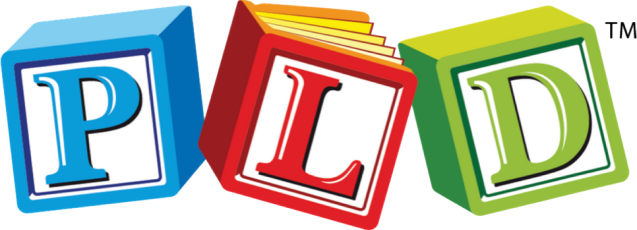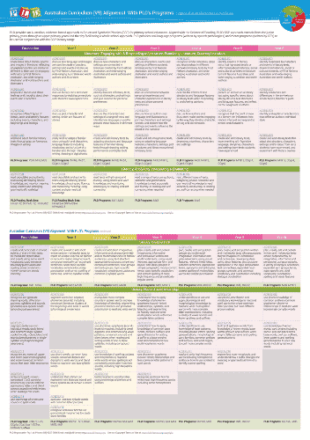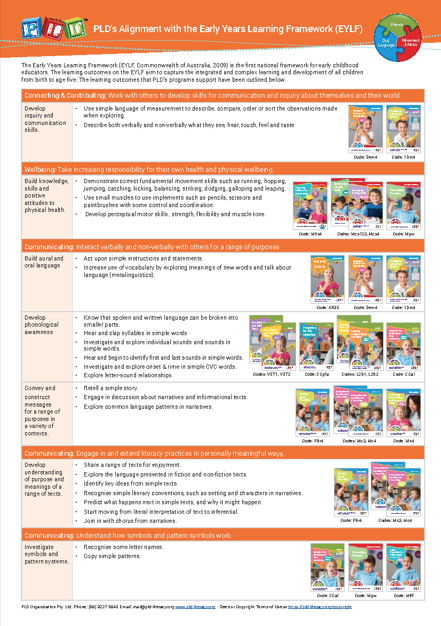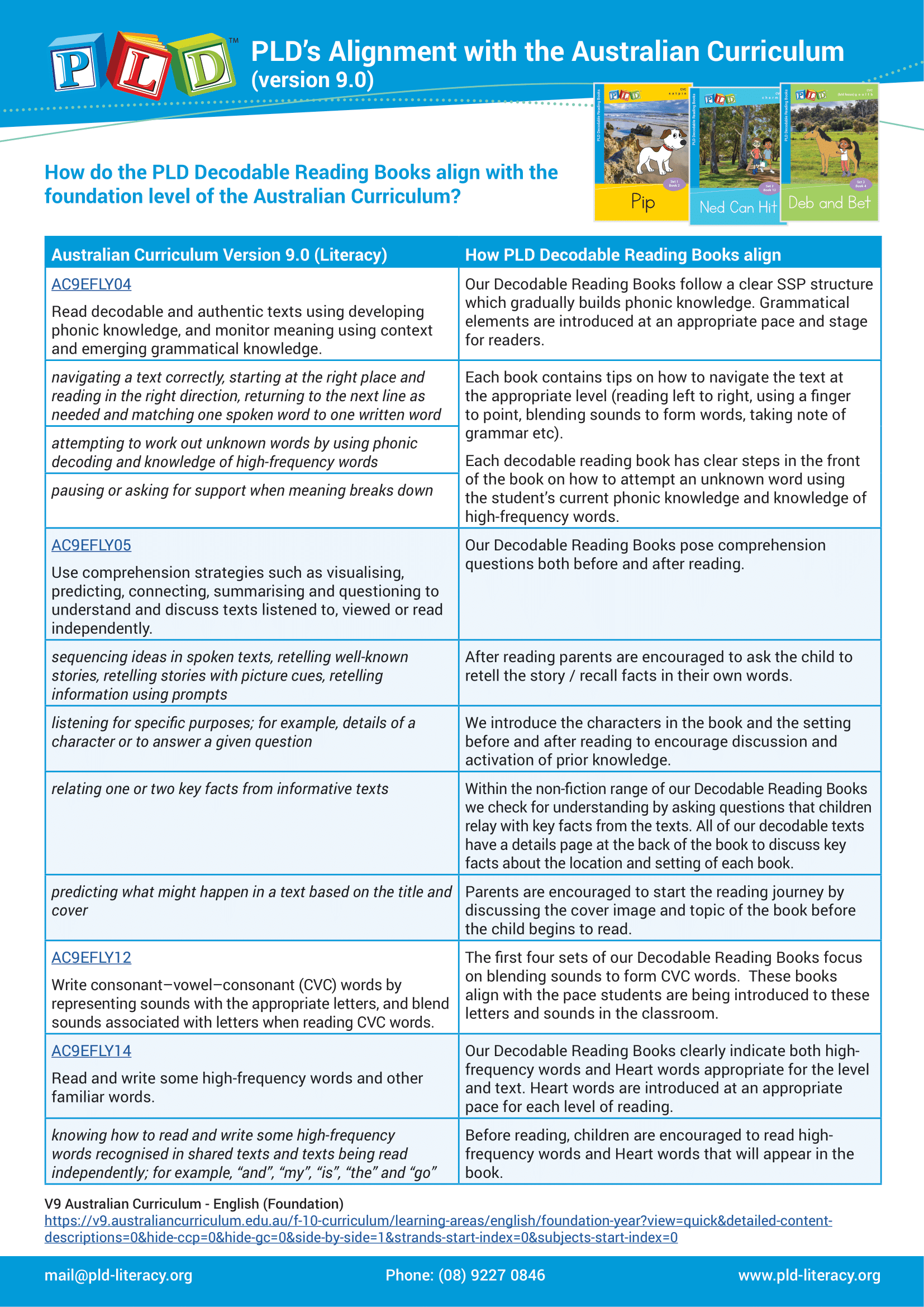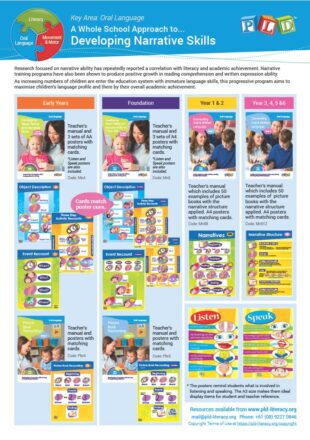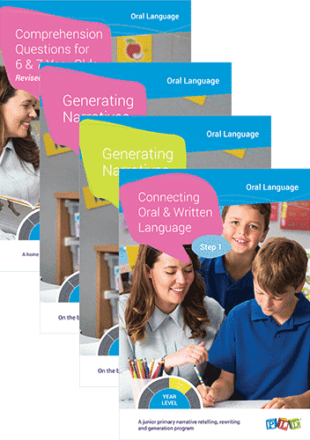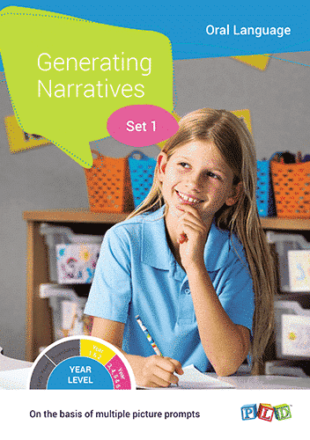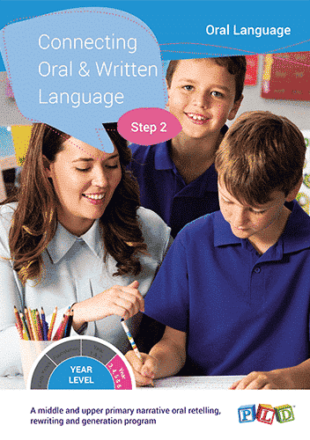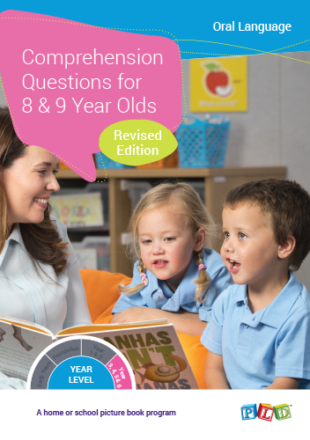-
PLD’s Alignment to the Australian National Curriculum
How does PLD align to the Australian National Curriculum?In the attached download we have outlined where PLD applies to each year level, the content code and descriptor and the related PLD programs.
-
PLD’s Alignment with the Early Years Learning Framework
-
PLD's Decodable Reading Books Alignment with the Australian Curriculum
Connecting Oral and Written Language – Step 1
$82.50 (inc. $7.50 GST)
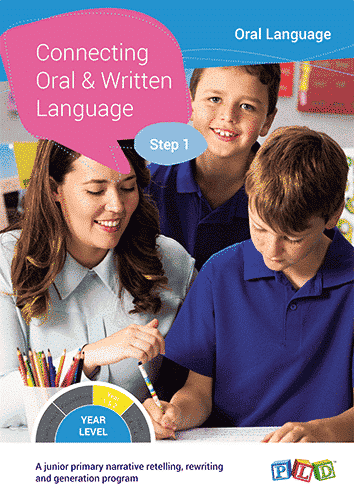

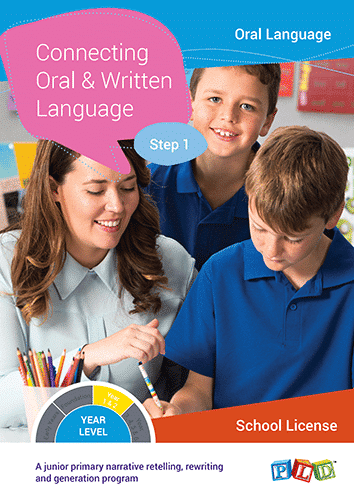
Instructional material outlining how to teach 6 to 8 year olds narrative oral retelling, rewriting and generation.
Although there are many types of genres, the most complex genre is narrative. The production of a narrative is more cognitively and linguistically demanding than participation in a conversation. Research repeatedly reports that narrative programs positively impact overall reading comprehension and written expression ability. Hence once skills are developed in this area, there is a flow on effect to all other forms of comprehension and written work.
Within Connecting Oral and Written Language – Step 1 the initial oral stage is incredibly important. From a Speech Pathology perspective, oral expression ability is the precursor to written expression ability. Too often students are required to generate narratives before solid foundation skills are established. Remember students need to be provided with multiple opportunities to analyse and orally retell familiar narratives. In this way, they are rehearsing and practicing their oral language skills and simultaneously developing a solid understanding of narrative structure. Remember do not underestimate the value of the initial oral stages of narrative skills development.
This program, designed by Speech Pathologists for 6 to 8 year olds features:
- Narrative tasks are presented in an order of ascending complexity (i.e. pre-narrative, oral narrative retells, written narrative retells and finally narrative generation).
- The manual outlines how to instruct 6 to 8 year old narrative ability and recommends over 45 suitable picture books.
- The classroom pack includes explicit narrative structure cards and display posters
The programs within the range include:
Early Years Programs:
Foundation Programs:
Year 1 & 2 Program:
Year 3, 4, 5 & 6 Program
This product is mentioned in the Year 1 & 2 Teaching Sequence Manual on page 20.
Connecting Oral and Written Language – Step 1 - eBook
$65.00 (inc. $5.91 GST)



eBooks are solely for use by a single individual user. e.g. An individual classroom teacher. Learn more.
Instructional material outlining how to teach 6 to 8 year olds narrative oral retelling, rewriting and generation.
Although there are many types of genres, the most complex genre is narrative. The production of a narrative is more cognitively and linguistically demanding than participation in a conversation. Research repeatedly reports that narrative programs positively impact overall reading comprehension and written expression ability. Hence once skills are developed in this area, there is a flow on effect to all other forms of comprehension and written work.
Within Connecting Oral and Written Language – Step 1 the initial oral stage is incredibly important. From a Speech Pathology perspective, oral expression ability is the precursor to written expression ability. Too often students are required to generate narratives before solid foundation skills are established. Remember students need to be provided with multiple opportunities to analyse and orally retell familiar narratives. In this way, they are rehearsing and practicing their oral language skills and simultaneously developing a solid understanding of narrative structure. Remember do not underestimate the value of the initial oral stages of narrative skills development.
This program, designed by Speech Pathologists for 6 to 8 year olds features:
- Narrative tasks are presented in an order of ascending complexity (i.e. pre-narrative, oral narrative retells, written narrative retells and finally narrative generation).
- The manual outlines how to instruct 6 to 8 year old narrative ability and recommends over 45 suitable picture books.
- The classroom pack includes explicit narrative structure cards and display posters
The programs within the range include:
Early Years Programs:
Foundation Programs:
Year 1 & 2 Program:
Year 3, 4, 5 & 6 Program
This product is mentioned in the Year 1 & 2 Teaching Sequence Manual on page 20.
eBooks are solely for use by a single individual user. e.g. An individual classroom teacher. Australian Copyright laws prohibit illegal distribution, storage or sharing of this eBook. Usage is tracked and breaches may result in prosecution. Learn more.
If you would like to provide multiple users with access to this resource we suggest selecting the 'Whole School Access' tab at the top of the screen to purchase a School Licence. Learn more.
Connecting Oral and Written Language – Step 1 – School Licence
$225.01 / year (inc. $20.46 GST)



This is a PLD Whole School Licence resource. By purchasing this licence, this program will be accessible as a digital flipbook that will be stored in your secure account on the PLD website. The program will be accessible as a digital flipbook that teachers can access on any device for as long as the licence is active. A School Licence is valid for 12 months from the date of purchase and can be shared with all staff employed at the school. We highly recommend that either the Principal, Deputy Principal or a member of the admin team purchase the School Licence in order to manage the account and its users. For more information, visit our Whole School Licence FAQ.
Instructional material outlining how to teach 6 to 8 year olds narrative oral retelling, rewriting and generation.
Although there are many types of genres, the most complex genre is narrative. The production of a narrative is more cognitively and linguistically demanding than participation in a conversation. Research repeatedly reports that narrative programs positively impact overall reading comprehension and written expression ability. Hence once skills are developed in this area, there is a flow on effect to all other forms of comprehension and written work.
Within Connecting Oral and Written Language – Step 1 the initial oral stage is incredibly important. From a Speech Pathology perspective, oral expression ability is the precursor to written expression ability. Too often students are required to generate narratives before solid foundation skills are established. Remember students need to be provided with multiple opportunities to analyse and orally retell familiar narratives. In this way, they are rehearsing and practicing their oral language skills and simultaneously developing a solid understanding of narrative structure. Remember do not underestimate the value of the initial oral stages of narrative skills development.
This program, designed by Speech Pathologists for 6 to 8 year olds features:
- Narrative tasks are presented in an order of ascending complexity (i.e. pre-narrative, oral narrative retells, written narrative retells and finally narrative generation).
- The manual outlines how to instruct 6 to 8 year old narrative ability and recommends over 45 suitable picture books.
- The classroom pack includes explicit narrative structure cards and display posters
The programs within the range include:
Early Years Programs:
Foundation Programs:
Year 1 & 2 Program:
Year 3, 4, 5 & 6 Program
This product is mentioned in the Year 1 & 2 Teaching Sequence Manual on page 20.
Books: PLD’s books may only be used by the Authorised Purchaser, and the Authorised Purchaser’s students, and only in conjunction with classes taken by the Authorised Purchaser. PLD’s books may be photocopied up to 10% per year for use only by the Authorised Purchaser. The Authorised Purchaser is defined as the original purchaser of the PLD materials.
eBooks: PLD’s eBooks may only be used by the Authorised Purchaser, and the Authorised Purchaser’s students, and only in conjunction with classes taken by the Authorised Purchaser. The Authorised Purchaser is defined as the original purchaser of the PLD eBook. Under the ‘Statutory Educational Licence’ the authorised purchaser can:
- View the eBook as a whole or in part
- Copy the eBook to their personal drive or locally on their device
- Display the eBook on your Interactive Whiteboard, projector or smart TV, for the purpose of teaching the students in their own classroom
- Photocopy or print up to 10% of the eBook per year, for use with the students in their classroom(s).
For copyright purposes, every page of the PLD eBooks will be stamped with the name & email address provided by the purchaser at the time of order. PLD ebooks belong solely to the purchaser and may not be shared with colleagues, parents or anyone else. PLD eBooks must not be uploaded to school servers, intranets or online platforms. Schools wishing to licence PLD eBooks can contact us HERE.
School Licences: A School Licence is a multi-user subscription to a PLD resource, such as a book or program, in a digital and printable format that is accessible via the ‘My Subscription’ section of the PLD website. A School Licence is valid for 12 months from the date of purchase and can be used by an unlimited number of teachers within a school. When bought under a School Licence:
- Resources are accessible in digital, flipbook format, which teachers can access from anywhere, at any time, on any device via the PLD website.
- The resources can be used by any amount of teachers in that school.
- Multiple teachers can access the resources simultaneously.
- The resource is available to print, subject to the standard 10% per year limitation as per Australian Copyright law.
- Updated versions of resources will be automatically accessible to users with a current licence for free, ensuring all users have access to the latest versions of resources.
- Resources are stored centrally and accessed via a secure login account on the PLD website. Thus, all currently subscription resources are accessible in the one convenient place, making resources extremely easy to find. Moreso, the school licence offering eradicates the frustration of lost or misplaced resources and programs which happens often with hardback books.
Additional information can be accessed via the following links:
Books: https://support.pld-literacy.org/en-au/article/plds-printed-electronic-materials-how-can-they-be-used-can-i-share-them-with-a-friendcolleague-9lk4y/
eBooks: https://support.pld-literacy.org/en-au/article/the-pld-ebooks-how-can-they-be-used-what-is-the-copyright-policy-ptfya8/
PLD’s Copyright Policy: https://support.pld-literacy.org/en-au/article/copyright-and-terms-of-use-of-pld-literacy-15tkcer/
ISBN :
9 781925 769975
ISBN :
9 781925 769975

